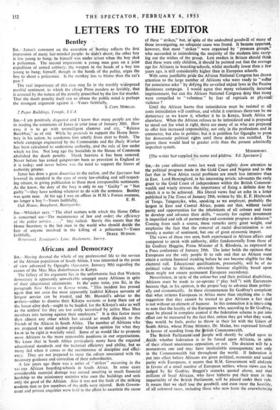Africans and Democracy Sta.—Haying devoted the whole of my professional
life to the service of the African population of South Africa, I was interested in the point of view advanced by Oguagha (Spectator, January 9th) regarding the causes of the Mau Mau disturbances in Kenya.
The fallacy of his argument lies in the unfortunate fact that Western democracy is apparently unworkable amo1ngst many Africans in spite of their educational attainments. In the same issue, you Sir, in the paragraph Nen. Moves in Kenya wrote, " This incident has proved again that not even the most apparently faithful Kikuyu servants of longest service can be trusted, and Mr. Blundell's, advice to the seitlers—either to dismiss their Kikuyu servants or keep them out of the house after dark—ought to be heeded, for the Kikuyu's sake as well as the settlers' for they are too easily terrorised by active Mau Mau members into turning against their employers." It is this factor more than almost any other which has caused so much disquiet to the friends of the African in South Africa. The number of Africans who arc prepared to stand against popular African opinion for what they knew to be right is woefully small. Some of us would like to promote more Africans to the more responsible positions in our organisations. We know that in South Africa particularly many have the required educational standards and the technical efficiency and ability, but so many fail when it comes to the maintenance of discipline and effici- ency. They are not prepared to incur the odium associated with the necessary guidance and correction of their subordinates. A few years ago there was a series of "strikes " occurring in the various African boarding-schools in South Africa. In some cases considerable material damage was caused resulting in much financial hardship to the missionary societies who own the buildings and seek only the good of the African. Also it was not the fault of the striking students that so few members of the staffs were injured. Both Govern- ment and private enquiries were held in the effort to ascertain the cause of these " strikes," but, in spite of the undoubted goodwill -of many of those investigating, no adequate cause was found. It-became apparent,
however, that most " strikes" were organised by " pressure groups," who succeeded in intimidating the majority of the students into carry- ing out the wishes of the group. Lest readers in Britain should think
that these were only children, it should be pointed out that the average age for Africans in boarding-schools, whilst markedly lower than a few years ago, is still considerably higher than in European schools.
With some justifiable pride the African National'Congress-has drawn attention to the large number of Africans who were ready to " suffer for conscience sake" by defying the so-called unjust laws in the Passive Resistance campaign. I would agree that many voluntarily incurred imprisonment, but can the African National Congress deny that many were compelled to " volunteer " by fear of reprisals or physical" violence ?
Until the African learns that intimidation must be resisted at all costs intimidation will continue, and whilst it continues there'can be no democracy as we know it, whether it be in Kenya, South Africa or elsewhere. When the African refuses to be intimidated and is prepared to stand out for what is right, there are many of us who are prep'ared to offer him increased responsibility, not only in the professions and in commerce, but also in politics; but it is pointless for Oguagha to press for democratic political rights until these defects are rectified. To ignore these would lead to greater evils than the present admittedly imperfect system.
MISSIONARY.
[The writer has supplied-his name and .0ddress. Ed-Spectator.]


































 Previous page
Previous page